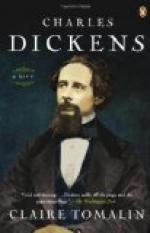[35] The Chalet, since sold and removed, stood at the edge of a kind of “wilderness,” which is separated from Gad’s Hill Place by the high road. A tunnel, constructed by Dickens, connects the “wilderness” and the garden of the house. Close to the road, in the “wilderness,” and fronting the house, are two fine cedars.
INDEX.
A.
“Administrative Reform” agitation, 129
All the Year Round, 114, 115
America, Dickens’ first visit to United States
in 1842, 71, 74-82, 94,
95; second visit in 1867-8, 152-153
“American Notes,” 68, 79-81
B.
“Barnaby Rudge,” 52, 69-70, 108
Barnard, Mr., his illustrations to Dickens’ works, 143
“Battle of Life,” 104
Bentley’s Miscellany edited by Dickens, 49, 51
“Bleak House,” 116-119
Boulogne, 119, 120
Bret Harte, Mr., on Little Nell, 64
Browne, or “Phiz,” his illustrations to Dickens’ works, 140-142
C.
Carlyle, his description of Dickens quoted, 35;
and of Dickens’ reading, 124;
his influence on Dickens, 126, 127;
see also 98 and 139
Chapman and Hall, 40, 41, 42, 51, 61
Chatham, 13
Childhood, Dickens’ feeling for its pathos, 12, 63
“Child’s History of England,” 115
“Chimes,” 55, 96-99, 142
“Christmas Carol,” 91-92, 125
“Christopher North,” 72
Cowden Clarke, Mrs., quoted, 110
Cruikshank, his illustrations to “Sketches” and “Oliver Twist,” 140-142
D.
Daily News, started with Dickens as editor,
99, 100, 103, 114
“David Copperfield”—in many
respects autobiographical, 14-16, 21, 133;
analysis of, 63, 68, 111-113
Dick, Mr., 107, 108
Dickens, Charles, birth, 12;
childhood and boyhood, 12-26;
school experiences, 25, 26;
law experiences, 27, 28;
experiences as reporter for the press,
28-30;
first attempts at authorship, 31-33;
marriage, 34;
his personal appearance in early manhood,
35, 36;
influence of his early training, 36-39;
pecuniary position after publication of
“Pickwick,” 51, 52;
habits of work and relaxation, 54-56;
reception at Edinburgh, 71, 72;
American experiences, 74-81;
affection for his children, 82, 83;
Italian experiences, 93-99;
appointed editor of Daily News,
99, 100;
efficiency in practical matters, 102,
103;
his charm as a holiday companion, 110;
first public readings in 1853, 121;
character of his reading, 124, 125;
purchase of Gad’s Hill Place, 131,
132;
separation from his wife, 132-138;




